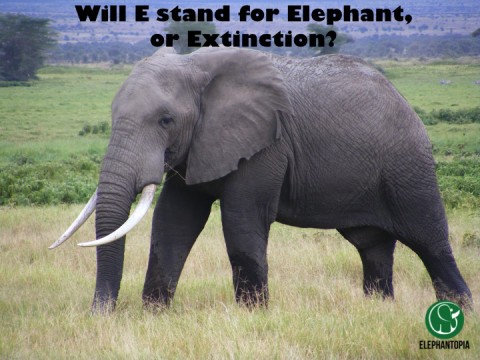Ivory Economics
A few weeks ago, I shared how the NRA in the United States is opposing the ivory ban. I was shocked to receive emails and comments from NRA members defending their desire to kill elephants and to sell ivory. My personal favorite statement was, and I quote,
I really don’t see how selling something increases demand.
A quick visit to wikipedia will refresh one’s understanding of how supply and demand work: when there is high demand for something, an equilibrium will not be found until the supply can successfully meet that demand. Unfortunately in the case for elephants and ivory, *the demand for ivory has exceeded the reproductive capacity of elephants. Which means of course, that the animal will eventually die out. (*shared from Marketplace)
Would flooding the market with ivory help drive down the demand? CITES allowed two legal sales of ivory, one in 1998 and one in 2008. However, instead of satiating the desire for ivory, it only increased the appetite of the world’s leading consumers (China & the US). Patrick Omondi, species management coordinator for the Kenyan Wildlife Service states, “This legal sale has restarted the demand for ivory, and illegal poachers and smugglers are back in business.” Since the 2008 legal ivory sale, elephant poaching rates have made a tragic comeback, reaching pre-1989 levels of up to 30,000 a year. And the sale did not lower the cost for ivory. According to Shruti Suresh from the Environmental Investigation Agency, the price of legal & documented ivory went up from $US 150 per kilogram, to now more than $US 1,500 per kilo. With ivory fetching such a high price, it’s no wonder poachers are trying to get illegal ivory on the market under the guise of the legal ivory trade.
As the world’s second highest consumer for ivory, a ban would cost potential ivory dealers and traders here in the United States hundreds and thousands of dollars in lost sales. And that is what the NRA and antique dealers here in the US are worried about: loosing the value and ability to sell their ivory or the ability to import massive quantities of ivory into the US from hunting expeditions.
The NRA has 3.1 million members and a call has been issued for a rally against the ivory trade. The current law allows each hunter to bring back two elephant trophies. But looking at the numbers, 3.1 million hunters far exceeds the estimated 400-600,000 elephants left in Africa. And all these people are calling on the US government to revoke the ivory ban.
In 2013, 200,000 letters were sent to the White House calling for the United States to take a stand against elephant poaching. Your voice was heard, as the administration formed the task force to investigate illegal wildlife trafficking partly in response to the public outcry over the escalating poaching crisis.
In 2014, can we rally 400-600,000 people to be the voice of the elephants? Please copy/paste the note below to the White House (click HERE for the direct link) and ask your friends to do the same. Remember, when the buying stops, the killings can too.
To the Honorable Mr. President,
I want to thank you for your dedication to end illegal wildlife trafficking. I am pleased with the recent ban on ivory sales in the US, as our nation is the world’s second largest consumer of ivory. As you know, the illegal ivory trade has direct links with terrorist organizations such as Al Shabaab, Kony and the LRA who are a threat not only to the United States, but to African governments and communities. It is my hope that other countries will quickly follow the example of the United States, banning sales of ivory & increasing the penalties for poachers & dealers of ivory. This is a monumental step toward halting the illegal ivory trade. Thank you.
Sincerely,
[Your Name, State of residence & Zip Code]








Please we need to save the elephants
Please let’s save the elephants.
The US has NOT implemented a ban on ivory. The President’s Wildlife Trafficking initiative is a federal regulation, not a law - which means it can be overturned with a new administration or be changed due to pressure from lobbies and interest groups (as the NRA and ivory dealers are trying to do). That’s why the laws of individual states to ban the ivory trade are so crucial.
Definitely - that’s why it’s great to see NY working on an ivory ban and HI doing the same…this is a great opinion article about the issue from the NY Times as well: http://www.nytimes.com/2014/02/18/opinion/banning-ivory-sales-in-america.html?_r=0 stating that the current rulings, if enforced, should have a great impact on ivory sales in the US and across state lines…
Reblogged this on matthewsted and commented:
This would be bad, very bad!
Reblogged this on "OUR WORLD".